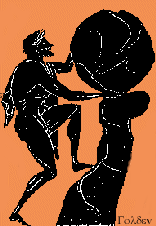
CONTENTS
|
Editing for Psychoanalysis Eve Golden, M.D. |
The Sisyphus
Complex
Good-enough psychoanalysis has to grapple with the negative
transference. Good-enough editing gets heavy too. Not copy editing,
maybe. Like the so-called supportive therapies, that can be helpful
without seriously challenging anyone's self-definition. But real
editing—the kind that addresses the structural and developmental issues
undermining a book's true self—is tough on everybody.
A pushing-boulders-up-the-hill quality is intrinsic to writing no matter what. In his 1954 paper "The Dream Specimen of Psychoanalysis," Erikson contemplates the impossibility of perfectly conveying internal experience in words. He was talking about dream analysis, but his caution applies more generally, and to good writers especially. People who struggle to write suffer less than their more fluent colleagues from the editorial process; they know that they can't always say what they mean very well, so they accept help less ambivalently and take suggestions less personally. Easy writers sometimes forget that others don't always hear what they intend in their carefully chosen words. Communication is a constant struggle to separate real understandings from the the jumble of partial ones that arise out of our endlessly individual endowments and experiences. That is why an editor's most important gift is often the one most unwelcome to her clients. It's not her grammar, or even her style, but her sensitivity to ambiguity. She has antennae that alert her when something can be read two ways, when a reader might be led astray by a surprise fork in an otherwise well-marked road. She is a skilled reconnaissance officer with a reliable compass. She checks out the author's route in advance, testing the map against the terrain so that any pitfalls can be identified safely and corrected privately. When readers set out to follow the author's path, she asks herself, will they be able to do it?

What's hard about this is that by the time an editor gets involved with a book, the project has often begun to feel finished to the author. When she asks for revisions, it hurts more than his amour propre; it's a pain in the ass as well. He knows that the editor's job is to help him get out of his own light, but changing a familiar and comfortable style is a whole new piece of work. Hard work. People invest plenty of narcissism in their prose; a red pencil can cut as deep as an interpretation. The dynamics are similar, too—How dare this person not see me as I see myself?—as the author wrestles with temporary resentment, depression, or fear while growing into a more commodious vision. And there are always financial considerations that may support the wish to avoid deeper engagement with an editor over a book.
It's not an easy process for the editor either, especially when she has come to like and respect her client and to value the work he's doing. She doesn't want to hurt his feelings, but she does want his book to be the best it possibly can. She knows he wants that too—that's why he came to her—and that at the end of it all he'll be thrilled with his accomplishment. But in the meantime she's got her own anxieties about aggression and the dangers of telling people things that they don't want to hear. Furthermore, her narcissism is on the line too. She knows that she's likely to be held responsible not only for her own work, but for his as well. The more that worries her, the more nervous she'll be about stopping too soon; same thing if she's short of work. The point of diminishing returns is a subtle one. The decision to terminate is complicated, and the honest editor, like the honest analyst, has to acknowledge that money issues are part of it.
So it's only partly in fun that I'm calling this psychosocial constellation the Sisyphus complex. Conflict and compromise formation are rife in writing, and there's no doubt that transference, countertransference, and resistance flourish within the editorial dyad. But these are rich sources of insight, and one of the pleasures of working with psychoanalysts is that they understand this. They know that anxiety is the mother of confusion, and that you can work on one by addressing the other. They know that it's risky to open up to readers without the protective walls of jargon and acadamese, but they also know that relinquishing defensiveness is sometimes both necessary and worthwhile. They know that an editor's not-me-ness, irksome as it may be, gives a young book the practice in separation that it needs before it goes off into a world of critical others. And they know that we've all got issues, and that we can talk about them.
